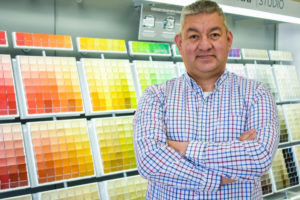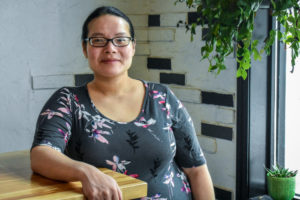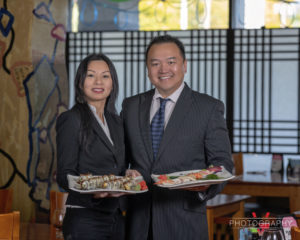American Dreamers
Three tales of immigrant-owned business success
According to a National Bureau of Economic Research report, immigrant entrepreneurs create about a quarter of new businesses in the United States. In the Fox Cities, these businesses add to the vibrancy of our commercial landscape. Here are three hard-fought and won entrepreneurial success stories from immigrants to the Fox Valley.
Kou Lee | owner, Koreana Restaurant & Sushi Bar
“Bruce Lee is not 100 percent Chinese. He is half German. But Bruce Lee does not belong to the Germans or the Chinese, Bruce belongs to all of us, and food is the same. I was born in Laos. For a little bit, I grew up in a refugee camp in Thailand. When I was 9, my family migrated to Detroit in 1987. At a very early age, my mom taught me how to make rice, how to sauté, taught me how to stir-fry. In the Hmong community, we have a lot of family gatherings. You have an opportunity to feed the entire family, friends of family, and sometimes there’s 200-plus people. That’s where I think I benefit the most from my parents, the ability to understand food and to be comfortable around the kitchen.
My wife [Janey] and I moved to the Fox Cities about 10 years ago for work. I was a grocery store manager for many, many years. That gave me a lot of advantage when I decided to run a restaurant. The dynamics have changed, but the philosophy of how you run a business is the same. At the moment we were looking, my friend called me up and told me his favorite restaurant was closing after 17 years and he was very sad. I asked my friend, ‘What restaurant is this? I am looking to start a business.’ And he said, ‘Koreana.’ After that, it was history. We decided we wanted to buy this place.
You can’t be a business owner without courage. When they turned the key over to me, we had to get everything up to code at a very, very fast pace. The old team was coaching us, showing us how they ran Koreana. We were learning and we hadn’t put a lot of our philosophies in place. So people came in and thought nothing was new. Others would say, ‘I want this from the old menu.’
Sometimes people will say, ‘You’re not Korean. The food might not taste the same.’ I have native Koreans who come eat here very frequently and they say, ‘Oh my gosh, tastes like home.’
We have received a lot of good feedback from our customers so far about the quality of the food. We want to be good neighbors to the community. We’re here to expose and bring food to everybody, because food is the connection, that bridge between all of us. People would travel far and wide to share a simple meal and share their stories, their joy, their sadness. That is the wonder of food. We have more stuff than we can ever imagine because the world is connected.”
Ruben Contreras | owner, Action Painting & Carpet Care
 “You have to just keep going. The results come later. I have a passion for painting because I used to do it in my country, Mexico, when I was 12, 14. My family had some properties there. Since I was in school, I would do painting on the side. I never got paid, but I really enjoyed it.
“You have to just keep going. The results come later. I have a passion for painting because I used to do it in my country, Mexico, when I was 12, 14. My family had some properties there. Since I was in school, I would do painting on the side. I never got paid, but I really enjoyed it.
I was 27 when I came to the Fox Valley in 1997. I originally came here because my brother was here already. I couldn’t speak English before. Fox Valley Technical College, they have a program for English as a Second Language. So that’s why I came to the Fox Valley, to learn English. I started out working in a restaurant, but at the same time I found a job as a painter for another company.
When my wife told me she was expecting a baby, I decided it was time to start my painting business because I want to manage my own schedule. The second thing was I knew if I had my own business, I would be part of the community. I was very grateful to the community, so I thought it was very important to give back.
To try and start my business in 2005, I had three jobs. I was a server, I was an interpreter and I was a [property] manager at the apartment where I was living. For the company I used to work for as interpreter, I used to sleep in the hospital at 10 p.m. until 6 in the morning. To translate, I had to be awake for the patients. I would get out of the hospital and work to paint, then went to the restaurant to serve tables. Things were tough. I recall, my wife and I, we were looking for pennies and dimes to get gas in my car because we were waiting to get paid from the jobs I worked. I had to divide my time for probably a year and a half.
When you start a business, you have to put more than 40 hours in per week with no pay. You have to just keep going. After years, I have a good relationship with customers. A lot of people are looking for my service. But I did this for my kids and to leave an impact for them. I want to show them that no matter where you come from, because I come from a different country, this is a country that is going to welcome you. After the storm passes, everything is going to be fine.”
Yee Lee Vue | owner, Bowl Ninety-One
 “I came to the United States with my family in 1991 as a refugee [in Thailand]. We settled in Kaukauna. During my [college] years, my mom was working in a factory and a side job at the farmers market in Appleton to support six of her children to go to college. Every weekend we would come home and help her at the farmers market. Because we’re the first generation doing business, we didn’t know what to expect especially because my mom does not speak English. I had to be the main person who communicated with vendors, accountants, lawyers. After doing the farmers market for five years, I basically helped them open Mai’s Deli in downtown Appleton. Helping my mom with the business inspired me to start my own dream. Just like how she did for her children, I wanted to do the same.
“I came to the United States with my family in 1991 as a refugee [in Thailand]. We settled in Kaukauna. During my [college] years, my mom was working in a factory and a side job at the farmers market in Appleton to support six of her children to go to college. Every weekend we would come home and help her at the farmers market. Because we’re the first generation doing business, we didn’t know what to expect especially because my mom does not speak English. I had to be the main person who communicated with vendors, accountants, lawyers. After doing the farmers market for five years, I basically helped them open Mai’s Deli in downtown Appleton. Helping my mom with the business inspired me to start my own dream. Just like how she did for her children, I wanted to do the same.
During the time I was going to college, my husband had to be a stay-at-home dad for five years. When he decided to go back into the workforce, he couldn’t find a job. We didn’t know what to do. I just graduated from college, and we were living on only one income. At the time, City Cafe, which used to be CSI, inside The City Center, was available. We were young at that time, but [the owner] knew we would be able to carry on his business, and he wanted to give us that opportunity, and he believed in us. So [we] decided to take on that new opportunity.
After three and a half years, we decided we wanted to grow. Some of the food trends were ramen, late-night eateries and this would be awesome to have in Appleton. So that was how we started Bowl Ninety-One.
I put so much passion into Bowl Ninety-One because we wanted the food to be different and unique. We didn’t start Bowl Ninety-One to compete with Asian restaurants in the community, but we wanted to enrich what we already have in the Fox Cities.
I wanted to create something beyond Bowl Ninety-One. Some of our staff are high school kids. They haven’t been trained to cook yet, but we train them. We equip them with the skills and the knowledge to become chefs and even without culinary school, we believe in them. We’re not just a restaurant, we’re like an organization that supports them to lead them where their career is going to take them. I believe in giving people chances and opportunities. I wanted to inspire the staff that I hire, so in the future, they can become entrepreneurs too, just how my mom did for me. It’s not just being an entrepreneur and being successful, but also making an impact in the community, whether it’s small or big. My whole life, people believed in me, and if people didn’t believe in me, I wouldn’t have been able to do it.”











Leave a Comment